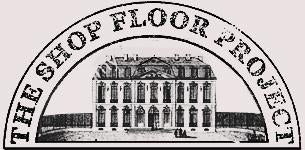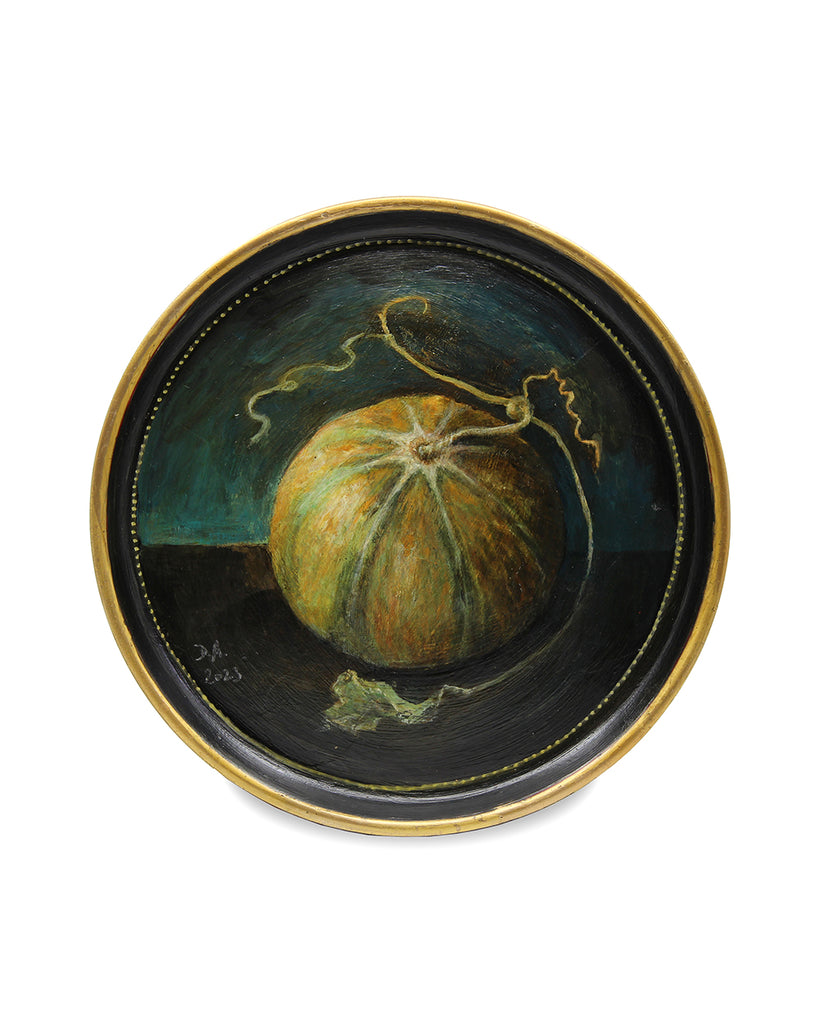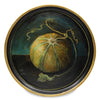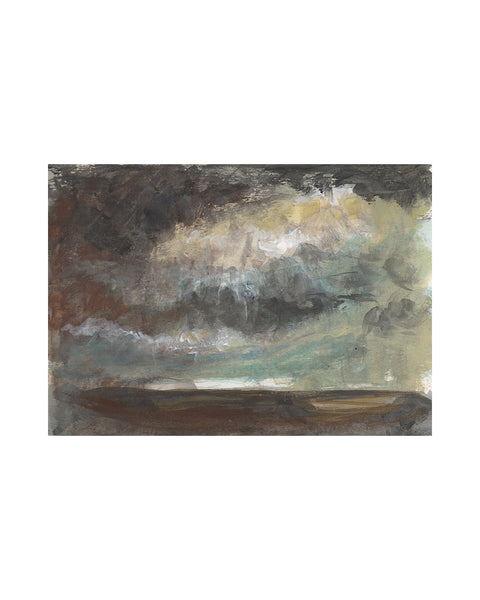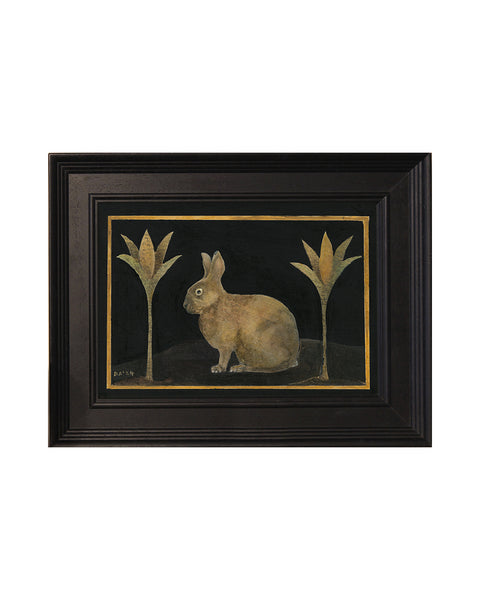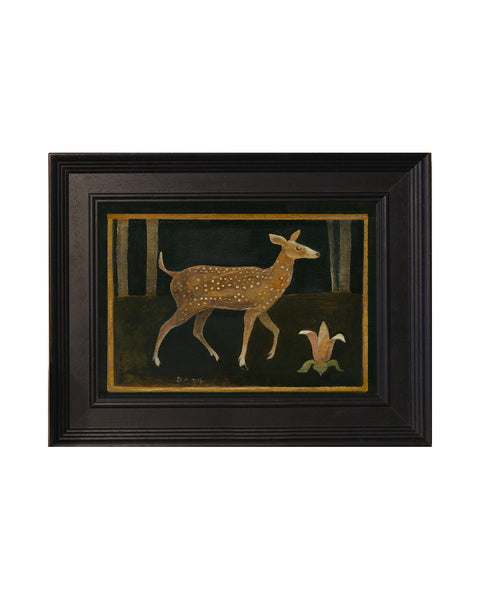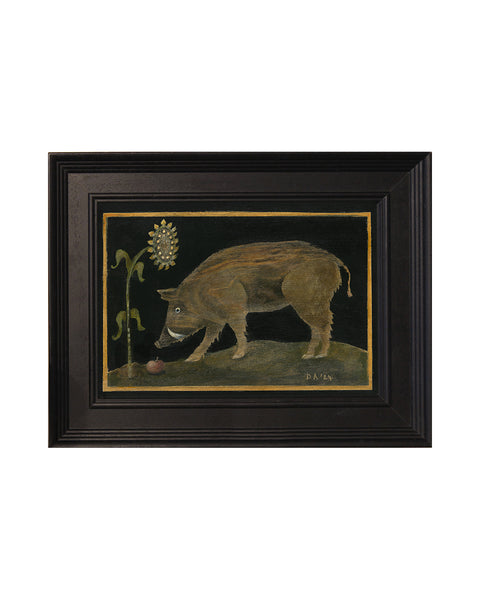
Product Details
A hand painted tray by Denise Allan.
Size: 31 x 31 x 3cm / 310 x 310 x 30mm / 12.2 x 12.2 x 1.2 inches
MATERIALS: Water based oil on Antique Papier Mache Tray.
Not recommended to display in a wet area such as a bathroom. The trays can be cleaned occasionally with a lightly damped cloth.
THE STORY

Step inside the canvas tent and cast your eyes over Denise Allan’s new collection inspired by the Agricultural Country Show. This prize-winning collection includes hand-painted antique trays and framed panel boards featuring vegetables, fruits, flowers and animals.

Dating back to the 18th century, Denise Allan has taken inspiration from the agricultural fairs of Britain, where specimens are still isolated as single objects, competing for the prize rosette. For the past two years Denise has been creating her very own exhibit of prize-winning pigeons, doves, artichokes, bulls, beetroots and turnips.

The collection consists of an extraordinary series of original paintings on wooden panels, antique trays and a series of beautiful fine art reproductions of pages from her sketchbook.

In her light-filled Cumbrian studio, Denise begins her latest collection.

Early drawings for the Prize Artichoke (above)

Every surface contains astonishing detail; The snap of the stalk on the artichoke, the curl of a vine, the roots of a turnip and the fur on a rabbit.

These details go beyond pure observational studies. Expressive, energetic painting makes these objects seem almost alive, elevating the prize-winning vegetable and fruits into sculptural, monumental objects set against stormy landscapes and weighted by the rich, dark soil.

Blanc De Hotot Rabbit tray (above) and detail of roots from Prize Swede (below).

The reworking of found trays for this collection plays with the relationship between a domestic, interior object and an external image; a device that Denise Allan often utilises in her work.

In our imagination, these black papier mache trays, transformed by the artist, could be from the grand kitchen of an 18th stately home, where the prize-winning vegetables and flowers from the gardens and greenhouses are celebrated and immortalised in gold edged trays and paintings.

Three miniature damson and plum trays

The specimens include wonderful names such as the January King Winter Cabbage (below), which is almost edible with its unruly, unfurling leaves revealing the heart in a tight ball at the centre.

And the Norfolk Grey Rooster standing proudly in a huge tray, glistening feathers, against a Norfolk marsh, feet in the wet reeds.

Each tray is highlighted with gold leaf stencil or pen work, echoing the 18th century examples that were made to reflect candlelight in Georgian houses. There are some historic imperfections deliberately left in the trays and incorporated within the painting to maintain the character and age of each piece.

Pumpkins and melons with twisting vines and crumpled leaves are all set against a dusk sky that Denise often revisits throughout her work. This twilight time is an interesting choice in her work, it is both unsettling and comforting - signifying a change or transient moment, the specimens and animals become monumental, sitting quietly and still in the changing light.


Playing with scale, the monumental Prize Quince, Radicchio and Artichoke are set against a golden sky and almost appear to be cast in bronze.

Given that the ‘weight’ and presence of these specimens are as tactile as a three-dimensional object, it is no surprise that Denise Allan studied sculpture as well as painting for her BA Hons. in Fine Art.

Often working with installations within the landscape, her early work was a form of Land Art, but increasingly, over the years, she enjoys bringing her work back into the studio. This interplay between interior and exterior, bringing the outside inside, means that the sense of being situated in the landscape always remains, and is a fascinating development from her early works.
